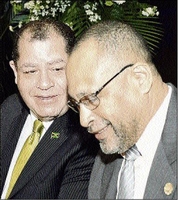BOJ Governor: Executive Exit - It was in the works
Published: Sunday | November 1, 2009

Minister of Finance Audley Shaw (left) in conversation with former BOJ Governor Derick Latibeaudiere. - Ricardo Makyn/Staff Photographer.
While there have been expressions of surprise in some quarters at the seemingly sudden resignation of Bank of Jamaica (BOJ) Governor Derick Latibeaudiere, with immediate effect on Friday, October 30, 2009, it has been an open secret that all has not been well between the governor and the Bruce Golding administration for several months.
Things heated up in November 2008 when the BOJ took the decision to precipitously raise domestic interest rates by 800 basis points (or eight per cent) in one fell swoop in an attempt to control foreign-exchange demand. This is similar to the move that was made in early 2003, and in both cases, this had a significant impact on the public sector interest payments and ultimately, on the fiscal deficit.
When questioned publicly about the one-shot eight per cent increase in interest rates and whether he was aware of the consequences of this action on the fiscal budget, the former BOJ governor always maintained that the core function of the central bank was to maintain headline inflation and the stability of the foreign-exchange market, and that it was not his responsibility to worry about the impact of monetary policy on the fiscal budget.
It is precisely this issue that is at the heart of the tension that existed between the administration and Governor Latibeaudiere.
full confidence
In fairness, it should also be pointed out that while the former Governor always had the full confidence of the former Minister of Finance, Dr Omar Davies, there was some disquiet among other members of the People's National Party administration with respect to the massive, build-up in arrears, including significant penalty interest, in an unsecured overdraft facility by the Sugar Company of Jamaica under his tenure as chairman of the board. And as pointed out in a three-part series written earlier this year in The Sunday Gleaner by former BOJ board member, Keith Senior, there were some persons who questioned the direction of monetary policy under the stewardship of Latibeaudiere.
When contacted overseas on Friday night, Minister Audley Shaw declined to provide the precise reasons for the decision that had been taken earlier that day to part company with the BOJ governor, but he said that there were "compelling reasons" why the decision had to be taken at this time.
Latibeaudiere is also refusing to comment publicly on the reasons for the decision, except to say that it was a "mutually agreed" decision. However, supporters of the former governor are stoutly insisting that he is being used as a scapegoat for the Golding administration's inability to sign off on a medium-term economic framework, which will have significant political and social consequences for the Jamaica Labour Party government.
Persons close to the current negotiations between the Government of Jamaica and International Monetary Fund (IMF) team suggest that one of the major sticking points is the impact that a drastic reduction in the fiscal-deficit target for the upcoming fiscal year 2010-2011 could have on the economy. It is being posited that the IMF team would like to see the fiscal deficit cut to five per cent next year, and that this would be made even more difficult given the fact that it is quite possible that the out-turn for fiscal deficit at the end of March 2010 would overshoot the target of 8.7 per cent.
In the latest IMF economic and fiscal indicators for the Jamaican economy, published earlier this month, the IMF projects that there will be negative economic growth of -3.6 per cent and -0.2 per cent for 2009 and 2010, and corresponding negative external current-account balances as a percentage of GDP of -14.4 per cent and -11.5 per cent, respectively. The projections also suggest that public sector primary expenditure as a percentage of GDP will remain high over the next year and a half at 23.6 per cent of GDP in 2009, and 21.8 per cent of GDP in 2010.
Government sources suggest that the Golding administration had been quietly interviewing persons for several months for the post of BOJ governor and that they had considered persons both locally and abroad.
Derick Latibeaudiere will be replaced by Brian Wynter, a former deputy governor of the BOJ and former executive director of the Financial Services Commission.









